How Income Taxes Shrink a $100,000 Salary in All 50 States

Not happy when you look closely at your paycheck and compare the "gross" amount with the far more puny "net"? It sure seems like a lot is lost to taxes -- but do you have any idea just how much?
You might be surprised.
Using a SmartAsset paycheck calculator, we determined how income taxes shrink a hypothetical $100,000 salary in all 50 states and the District of Columbia. See how a good-sized salary is reduced to teeny-tiny take-home pay where you live.
No wonder it's so tough to save money. (But you can do it!)
Alabama

A cool evening in Fairhope, Alabama
In this Southern state that's home to NASA's Marshall Space Flight Center, federal and state taxes bring a $100,000 salary into a more earthly orbit: an estimated take-home of $72,123.
State income tax eats up 3.97% of your $100K. Note that if you live or work in the city of Birmingham, you also pay a local income tax of 1%.
The sales tax in Alabama is 4%, but shoppers can pay as much as 11% in state and local sales taxes.
Alaska

A panoramic view of tundra and mountainous landscape in the last frontier of Alaska
In America's northernmost state, a $100,000 salary heads south to an estimated $75,898 in take-home pay after federal taxes.
There are no state or local income taxes in Alaska; in fact, if you live here the state pays YOU. Most citizens receive an annual dividend from the state's oil wealth, which presents a golden opportunity for savings each year. Residents received $1,600 per person in 2018.
Alaska also has no state sales tax, though you might pay up to 7.5% in local sales taxes.
Arizona

Monument Valley, Arizona
In Arizona, known for the Grand Canyon, beautiful deserts and "dry heat," a $100,000 salary cools down to $73,396 after federal and state taxes are paid.
State income tax eats up 2.7% of those earnings. But you don't have to worry about local income tax anywhere in Arizona.
You do pay sales taxes: The state has a 5.6% sales tax, and when local sales taxes are added you might find yourself paying as much as 11.2% on your purchases.
Arkansas

A grand view of Mount Magazine State Park
In the state that gave us Walmart, a $100,000 salary is discounted (and not in the good way) to take-home pay of $70,314 once state and federal taxes are subtracted.
State income tax gobbles up 5.78% of those wages in Arkansas, and local income tax is a thing in several school districts.
The Natural State also has sales taxes (naturally?): a 6.5% state sales tax plus local taxes that can add up to another 5% to shoppers' register receipts, for a total of 11.5%.
California

A view of the Los Angeles, California skyline at sunset
You can leave your heart in San Francisco — and when you work anywhere in California you leave a big chunk of your pay behind to taxes. Your take-home from a $100,000 salary, after federal and state taxes, is just $68,332.
State income tax swallows 6.76% of your $100K pay in the Golden State. But there are no local income taxes.
California's state sales tax is the highest in the nation, at 7.25%, and local sales taxes can have you paying up to 10.25% in some communities.
Colorado

A ranch fence overlooking Mount Wilson, Colorado
In Colorado, the mountains are high, the rocks are red, the air is pure — and federal and state taxes will cut a $100,000 salary down to $71,760. The state tax bite amounts to 4.34% of that six-figure income.
Three Colorado cities — Aurora, Denver and Greenwood Village — also have local income taxes charged as flat sums. For example, in Aurora you pay $2 a month for each month in which you earn more than $250.
The state sales tax rate in Colorado is 2.9%. Factor in local sales taxes, and you might pay as much as 11.2% when you make a purchase in the Centennial State.
Connecticut

A view of the skyline and the Connecticut State Capitol Building in Hartford, Connecticut.
When you score a $100,000 salary in the state that's home to ESPN, federal and state taxes will kick it down to take-home pay of $70,872.
State income tax drains off 5.22% of those earnings. But Connecticut does not have local income taxes.
The Nutmeg State also doesn't let its cities, counties or other local jurisdictions collect their own sales taxes. So, the sales tax throughout Connecticut is the state rate: 6.35%.
Delaware

Bethany Beach, Delaware is a popular relaxation destination for the local population
In this small state, federal and state taxes will shrink a $100,000 salary down to $70,837 in take-home pay.
State income tax in Delaware eats away 5.26% of that income. The state's largest city, Wilmington, also has a local income tax that takes 1.25% of earnings.
But here's a plus: Delaware has no sales tax — which makes the state a popular shopping stop for motorists making their way up or down the East Coast along Interstate 95.
District of Columbia

Washington, D.C. skyline with highways and monuments
In the nation's capital, you lose a lot of the other kind of capital to taxes. A $100,000 salary is reduced to just $69,548.
The District of Columbia's income tax effectively takes 6.55% of the money, plus residents pay federal income tax. (The license plates say "End Taxation Without Representation" — because D.C. has no votes in Congress, despite the federal taxes it pays.)
The local tax is progressive just like the federal system and has three marginal tax rates; the highest, 8.5%, kicks in for income amounts of $40,000 or more. The district also has a 6% sales tax.
Florida

Orlando, Florida downtown city skyline on Eola Lake
In tax-friendly Florida, you have more money to save and invest because you take home an estimated $76,096 from a $100,000 salary
The Sunshine State doesn't have a state income tax, which is one of the reasons Florida is such a popular retirement destination. (Of course, the sun, warmth and beaches are all high on the list, too.)
The state has other taxes and fees to fund services, including a 6% state sales tax and local sales taxes that can tack on another 2.5%. And when you run your air conditioning, you pay Florida's 6.95% tax on electricity.
Georgia

Athens, Georgia, USA downtown at sunset.
While taxes aren't exactly peachy in Georgia, they're not quite the pits either. A $100,000 salary drops to an estimated $70,586 in take-home after federal and state taxes.
State income tax picks off 5.51% of that six-figure pay. But Georgia doesn't have local income taxes.
The state does have a 4% sales tax, and the total tax can be as high as 9% when local sales taxes are added. Fortunately for Georgians, sales doesn't apply to a local institution, Coca-Cola (which was created here), because soft drinks are exempt.
Hawaii

Skyline of Honolulu, Hawaii and the surrounding area including the hotels and buildings on Waikiki Beach
Housing is expensive in Hawaii. So are food, gasoline and other goods, because of the cost of transporting stuff to the remote islands. And, taxes are a financial strain, too.
Federal and state taxes will have you saying aloha (meaning goodbye, in this case) to a big chunk of a $100,000 salary, leaving you with just $68,587. You lose a steep-as-Diamond-Head 7.23% to the state's income tax.
If it's any consolation, sales taxes here aren't quite as bad as in other states. The state sales tax is 4%, and the highest total tax on purchases — including local sales taxes — is 4.5%.
Idaho
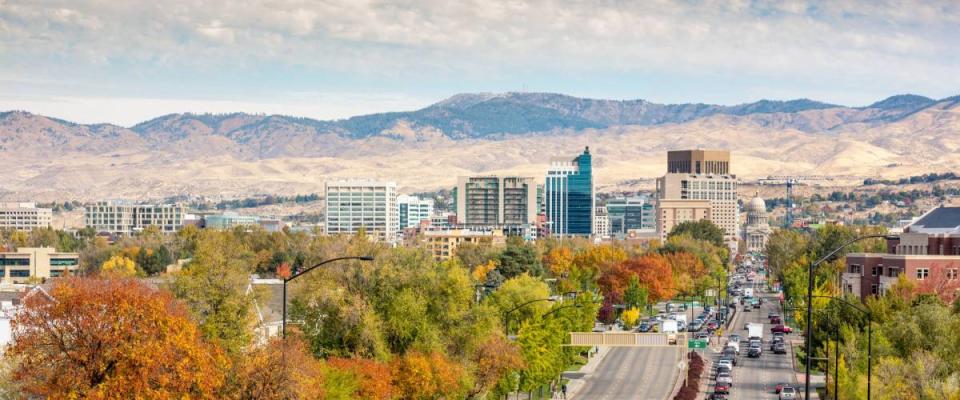
Boise Idaho street leading to the capital building in fall
In this state that's world-famous for its potatoes, residents may feel that they pay taxes by the bushelful — but the State Tax Commission's most recent assessment found Idaho ranks No. 46 among the states for the tax burden placed on citizens.
A $100,000 annual salary in Idaho is mashed down to $70,546 after state and federal taxes, with the state's income tax taking a 5.5% helping.
Idahoans pay sales tax of up to 9% — including when they buy their 5-pound bags of spuds. The sales tax applies to groceries in Idaho, though taxpayers can claim a grocery tax credit that averages $100 per person per year.
Illinois

A view from the suburbs all the way to downtown Chicago, Illinois
Illinois may be home to some of the tallest buildings in the U.S., including Chicago's Willis Tower, but — fortunately for residents — income taxes don't stand high above what people pay in other states.
When you earn $100,000 in the Prairie State, you take home **$71,253 **after federal and state taxes. The Illinois income tax siphons off 4.84% of that salary.
But if taxes on your income are a relative bargain in Illinois, the same cannot be said for sales taxes. They can be as high as 11%, including the 6.25% state sales tax and any local add-on.
Indiana

Downtown of Indianapolis by Indiana Central Canal
Take-home pay: $72,747 3.20% 7% 7%
In the Hoosier State, federal and state taxes shrink a $100,000 salary to $72,898, which might sound pretty good compared to other states. State taxes take 3.2% from your six-figure salary.
But, to borrow from the Indy 500, your paycheck would still have another lap to go. Indiana counties also tax incomes — by up to another 2.86%.
Here's one source of relief: Indiana has a 7% sales tax, and it's the same throughout the state. Shoppers and merchants don't have to worry about local piggyback sales taxes.
Iowa
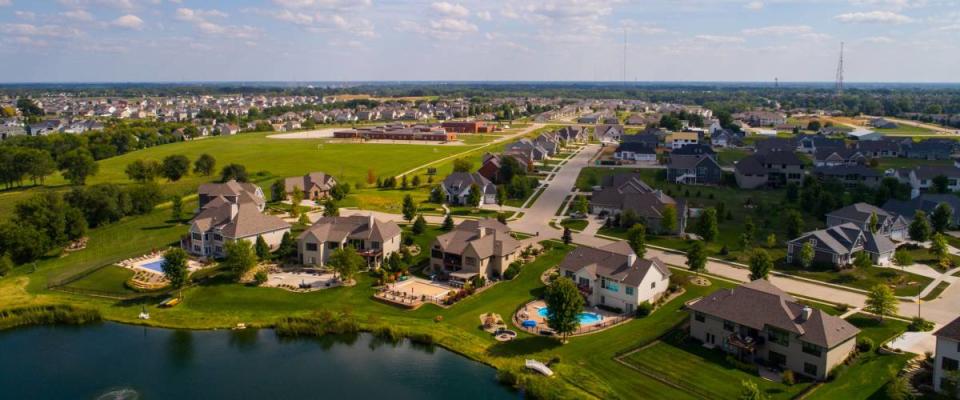
Aerial image of single family homes in Bettendorf, Iowa
Iowa is known for its huge corn crop, its political caucuses that exert a magnetic pull on presidential candidates, and its tradition of turning out college wrestling champions.
A $100,000 salary in the Hawkeye State is wrestled down to $70,320 by federal and state taxes, with the state subtracting 5.78%. Then, school districts take down more of your income — by charging a surtax of up to 16% of the amount paid in state tax.
Iowa also has a state sales tax of 6%, and a few cities collect an additional 1% on purchases.
Kansas

Wichita, Kansas, USA downtown skyline at dusk
Kansas is known as the Sunflower State or the Wheat State. Whatever you want to call it, a person earning a $100,000 salary here takes home $71,152 after federal and state taxes. The state income tax bites off 4.94%.
Kansans pay a 6.5% state sales tax, plus local sales taxes that can add another 4%.
Shoppers pay 6.5% even on groceries, which The Wichita Eagle says is the nation's second-highest food tax, after Mississippi's 7% grocery tax.
Kentucky

Louisville, Kentucky, USA skyline on the river.
In the state that's associated with bluegrass, horse racing and finger-lickin'-good fried chicken, federal and state taxes pluck off enough to reduce a $100,000 salary to $71,230.
Kentucky's state income tax carves away 4.87% of that annual paycheck. And that's not all: Dozens of cities and counties also assess income taxes, so in many places your total tax burden isn't chicken feed.
If it's any consolation, Kentucky has a straight 6% sales tax statewide. No local sales taxes are added on.
Louisiana
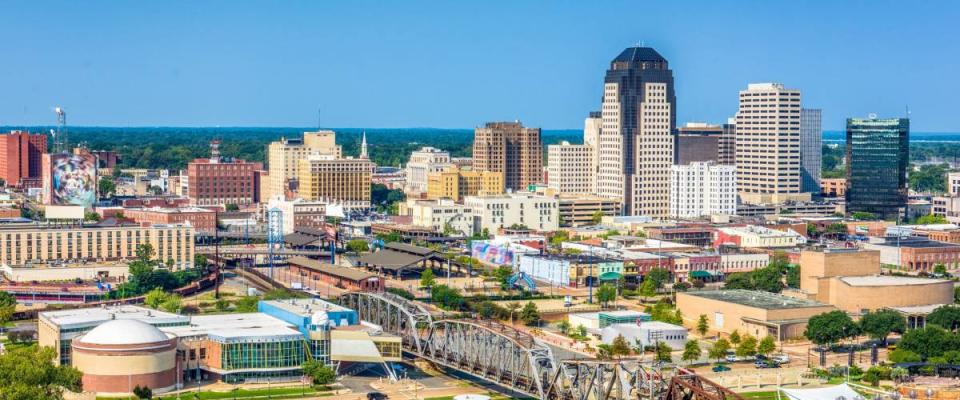
Shreveport, Louisiana, USA downtown skyline over the river.
The taxes in Lousiana may be enough to get some Cajuns ragin'. A $100,000 salary in the Pelican State becomes $71,690 after federal and state taxes.
The state's share is 4.41%. But there are no local taxes on the bayou — or anywhere else in Louisiana.
There's also a state sales tax of 4.45%, which used to be 5% but was reduced in July 2018. With local sales taxes that can tack on another 7%, Louisiana shoppers pay an average sales tax of 9.45%, one of the highest in the U.S.
Maine

Portland, Maine, USA coastal townscape.
In Maine, a state known for its lobster boils (make that lobstah boils), federal and state taxes boil off about 30% of a $100,000 annual salary, leaving $70,042 in take-home pay.
State income tax evaporates away 6.05% of your six-figure earnings. But at least there are no local income taxes to eat away even more.
The Pine Tree State has a 5.5% state sales tax and no local sales taxes. At least not right now. A proposal in the state legislature would allow Maine cities and towns to start charging sales taxes.
Maryland

Annapolis, Maryland, USA downtown view over Main Street with the State House.
Maryland packs so much into a small space: mountains, an ocean beach, a major city (Baltimore), tons of history — and all the crabs, crabs, crabs you can eat.
It also loads on the income taxes. Federal and state taxes cut down a $100,000 salary to $71,593, with the state's income tax biting off 4.5% of that income. And then, county taxes or the Baltimore city tax take as much as 3.2% more.
Marylanders also pay a 6% state sales tax, but there are no local sales taxes.
Massachusetts

Worcester, Massachusetts, USA downtown skyline.
Though this state often has been mocked with the nickname "Taxachusetts," income taxes here don't seem quite so bad compared to many other states.
Earn a $100,000 salary in the Bay State (the real nickname!), and your take-home after federal and state taxes is $71,322. The state's cut works out to 4.77% of that six-figure salary, but there are no local income taxes.
Massachusetts also doesn't have local sales taxes. Throughout the state, shoppers are charged a state sales tax of 6.25% on most purchases.
Michigan

Downtown Traverse City Michigan
A $100,000 Michigan salary is trimmed to $72,018 by federal and state taxes, including an estimated 4.08% state income tax bite.
But, in this blue-collar state that's closely associated with the auto industry, you can wind up with a much smaller paycheck in your tank thanks to local income taxes of up to 2.4% in 23 Michigan cities.
Michiganders also pay 6% sales tax statewide. There are no local sales taxes.
Minnesota

Minneapolis Minnesota at sunset on the Mississippi river,
In the state that gave us the legend of Paul Bunyan, taxes can seem outsize, too.
Federal and state taxes whittle down a $100,000 salary to just $69,876, with state taxes peeling off an estimated 6.22% of that income. But the Land of 10,000 Lakes has zero local income taxes.
Sales taxes are another story: Minnesota has a state sales tax of 6.875%, and local sales taxes can add up to another 1.5% to the cost of most purchases.
Mississippi

Jackson, Mississippi, USA skyline over the Capitol Building.
Though a hurricane coming up from the Gulf of Mexico might rattle your rafters in Mississippi, taxes won't blow away too much of your six-figure paycheck, relatively speaking.
Federal and state taxes reduce a $100,000 salary to take-home pay of $71,691 in Mississippi. The share taken by the state's income tax is an estimated 4.41%.
Mississippi doesn't have local income taxes. The sales tax is 7%, and only two cities add local sales tax: Jackson (1%) and Tupelo (0.25%).
Missouri

The Gateway Arch in St. Louis, Missouri
In the Show-Me State, you have $71,421 to show from a $100,000 salary after federal and state taxes.
The state income tax consumes 4.67% of that six-figure income. St. Louis and Kansas City also levy 1% local income taxes on earnings.
Missouri has a 4.225% state sales tax. (Which works out to 4 and 9/40 cents. How's that for random?) Shoppers can wind up paying more than 10% when local sales tax is added.
Montana

Sunset in Montana
Here in the Big Sky State, a $100,000 annual salary doesn't seem quite so big after taxes.
Federal and state taxes leave you with just $70,632 from your six-figure salary. The state's income tax takes an estimated 5.46%, but there are no local income taxes to worry about in Montana.
Sales taxes are uncomplicated, too: There aren't any here! The price you see is the price you pay.
Nebraska

Sunset over river and skyline, Omaha, NE.
Nebraska is home to the Oracle of Omaha, the legendary investor Warren Buffett — who really is paid an annual salary of $100,000 by his company Berkshire Hathaway. (Though, obviously, he earns a lot more from his investments.)
In Nebraska, $70,384 of a $100K salary is left after federal and state taxes. The state's income tax gobbles up 5.71% of that income.
The state has a 5.5% sales tax, and local income taxes add as much as 2% more. Groceries are exempt from the tax, but not prepared foods — so Buffett pays tax on his well-known breakfast runs to McDonald's.
Nevada
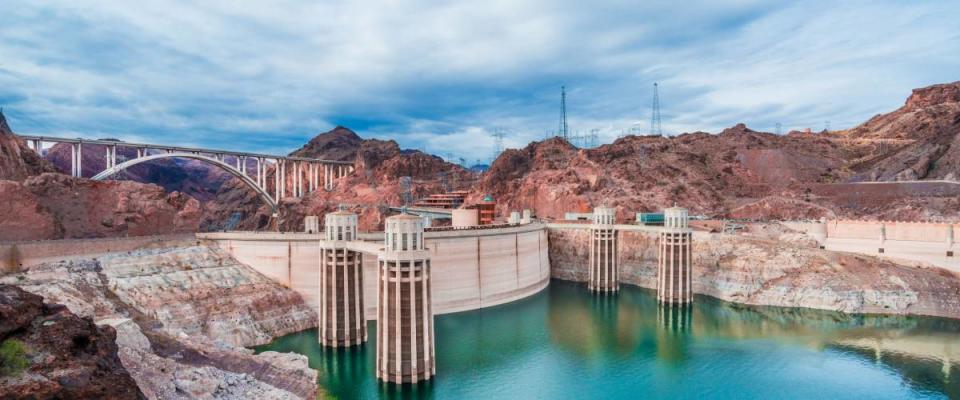
View of the Hoover Dam in Nevada, USA
Nevada's lack of a state income tax means anyone earning a six-figure salary can take home more of it to wager at the state's gambling tables. (But we'd much rather see you investing the extra money, maybe through an automated investing service.)
After federal taxes, a $100,000 annual earner in Nevada has $76,096 left to play with.
The state has a sales tax that adds 4.6% to the cost of most purchases, and county and other local sales taxes can increase the total hit to more than 8%.
New Hampshire

Portsmouth, New Hampshire, USA
New Hampshire's license plates proudly proclaim the state's motto, "Live Free or Die." They're serious about that: Personal incomes and purchases are tax-free in the Granite State.
Thanks to the lack of a state income tax on wages, a $100,000 salary is reduced to $76,096 by federal taxes.
New Hampshire also has no sales taxes and no estate tax. The state does slap a 5% tax on any interest or dividends you earn.
New Jersey

Trenton skyline panorama at dawn.
In the Garden State, a $100,000 annual salary is mowed down to $71,248 in take-home pay after federal and state taxes.
The share going to New Jersey's state income tax amounts to an estimated 4.61% of that six-figure income. And, in the one state where motorists still aren't allowed to pump their own gas, cities and counties aren't permitted to levy their own income taxes.
Local government also can't institute its own sales taxes. Shoppers pay a uniform 6.625% sales tax statewide.
New Mexico

Views of Santa Fe New Mexico
One of the main events in New Mexico each year is the nine-day Albuquerque International Balloon Fiesta, which fills the skies with hundreds of spectacular hot-air balloons.
New Mexicans who need help coming back down to Earth might want to consider this: Federal and state taxes deflate a $100,000 salary to $71,852. State taxes take 4.24% of the money.
The "Land of Enchantment" (the official state nickname!) also has a 5.125% state sales tax and local add-on taxes that can push the total sales tax above 9%. Up, up and away!
New York

New York, New York, USA skyline.
In New York, federal and state taxes chop a $100,000 salary down to $70,467 — with 5.51% going to state income tax — and that might not sound so bad for a state that's known for its high cost of living.
But if you live in New York City, fugeddaboudit! There, you'll be left with a measly $66,888, because the Big Apple has its own income tax. Suburban Yonkers has one, too.
New York state has a 4% sales tax, and local taxes can push the total sales tax to close to 9%.
North Carolina

Asheville, North Carolina, USA at twilight.
North Carolina has bragging rights over its Carolina kin: Income taxes are lower here than in South Carolina.
A person earning $100,000 a year in North Carolina keeps $71,126 after federal and state taxes, including a state tax on incomes that takes an estimated 4.97% from your six-figure salary.
The Tar Heel State has no local income taxes. There's a state sales tax of 4.75%, and thanks to local sales taxes you can pay as much as 7.5% in total tax on your purchases.
North Dakota

Sunrise over Theodore Roosevelt National Park, North Dakota
People living in North Dakota have to endure brutal winters, mosquito-filled summers and loneliness year-round here in one of the least densely populated states.
But one of the many good things about living in North Dakota is the taxes. A $100,000 salary is trimmed to just $74,561 by federal and state taxes, including a state income tax that pulls off only 1.53% of that income.
North Dakota doesn't have local income taxes, and the state sales tax is 5%. Local sales taxes can tack on up to 3.5% more.
Ohio

Condos and apartments overlooking the Ohio River in Cincinnati
In Ohio, a $100,000 salary turns into take-home of $72,675 after federal and state taxes, with the Buckeye State's income tax tugging away an estimated 3.42%.
But wait, there's more! Ohio also allows hundreds of cities and towns to impose their own income taxes — ranging up to 3%.
Plus, there's a 5.75% state sales tax, and local sales taxes that can have shoppers paying as much as 8% on their purchases.
Oklahoma

Brick town in Oklahoma
Broadway tells us that corn in Oklahoma is "as high as an elephant's eye" — but the income taxes aren't quite so towering.
An Oklahoman earning a $100,000 annual salary has $71,652 left after federal and state taxes, including state income tax that takes an estimated 4.44% of that six-figure pay.
Sooner State taxpayers don't have to worry about local income tax. Sales taxes can be as steep as 11.5% (ouch!). The state's rate is 4.5%, and then you might pay several layers of local sales taxes.
Oregon

Aerial View of the Old Mill District in Bend, Oregon, USA
In beautiful Oregon, income taxes can seem as breathtaking and as soaring as Mount Hood — which stands more than 2 miles above sea level.
A $100,000 annual salary falls to $68,308 after federal and state taxes are paid. The state's income tax bites off a hefty chunk: an estimated 7.76%.
But you can buy your Nike sneakers and other products made in Oregon tax-free. Oregon is another state where you pay no sales tax.
Pennsylvania

View of Main Street in Shrewsbury, Pennsylvania
Take-home pay: $72,815 3.07% 6% 8%
Pennsylvania is the state that gave America its Declaration of Independence (in Philadelphia), and it's known for major league sports, Hershey chocolates, and for being the first state to put its URL on the license plates.
But the state is not known as any kind of a tax haven. A $100,000 salary is reduced to $72,966 by federal and state taxes, including the state's income tax, which grabs a 3.07% share.
Pennsylvania also has local income taxes, which can be as high as 3.88%. The state sales tax is 6%, and there are a couple of local sales taxes: 1% in Allegheny County, which includes Pittsburgh, and 2% in Philly.
Rhode Island

Picturesque view of a small town in Rhode Island.
America's smallest state by area has larger-than-average living costs, but the taxes aren't quite as bad as in other expensive coastal states.
After federal and state taxes wash away part of a $100,000 annual salary in the Ocean State, you're left with $71,256 in take-home pay. The share going to state income tax is an estimated 4.08%.
But Rhode Islanders don't pay local income tax — or local sales tax. The sales tax statewide is a uniform 7%.
South Carolina

Charleston, South Carolina, USA at the historic homes on The Battery.
Cross the state line from North Carolina into South Carolina and — after you stop at the famed South of the Border tourist trap on Interstate 95 — you enter a land of higher taxes.
In the Palmetto State, federal and state taxes shrink a $100,000 salary to $69,806, versus $71,126 in the neighbor to the north. In South Carolina, a sizable 6.29% goes to state income tax, but there are no local income taxes.
The state's sales tax (including on any souvenirs you might want to buy at South of the Border) is 6%, though some cities and counties charge 1% or 2% extra.
South Dakota

Beautiful Sylvan Lake in Custer State Park
South Dakota often ranks high among the best states for retirement, and one reason is the low taxes. The state's workers see the effects long before they're thinking about retiring.
The Mount Rushmore State doesn't have an income tax, so a resident earning a $100,000 annual salary can take home $76,096 after federal taxes.
You do pay sales tax in South Dakota. Shoppers pay a 4.5% state rate, but the total tax can be as high as 6.5% once local sales taxes are added.
Tennessee

Tennessee River in Knoxville, Tennessee
In this state that's home to two music capitals — Nashville and Memphis — people aren't as likely to sing the blues over taxes as they do in other states.
Tennessee doesn't tax salaries or wages, so when you earn $100,000 a year here, you're left with $76,096 after federal taxes. The savings will buy you a lot of Memphis barbecue!
The state does tax interest and dividends, but that levy is being phased out and will be gone completely by 2021. Tennessee has a state sales tax of 7%, and local taxes can raise the total rate paid by shoppers as high as 9.75%.
Texas

Dallas, Texas cityscape with blue sky at sunset, Texas
Texas is the second-largest state by population, after California, and second-largest in size, after Alaska. Yep, as they say, everything IS big in Texas.
Except for income taxes. Texas doesn't have one, so your take-home from a $100,000 salary (maybe earned at one of the giant oil companies operating in Texas) is $76,096, with only federal taxes taken out.
The Lone Star State also doesn't have an inheritance tax. But there are sales taxes: a 6.25% state sales tax plus local ones that can add up to 2% more to the cost of most purchases.
Utah
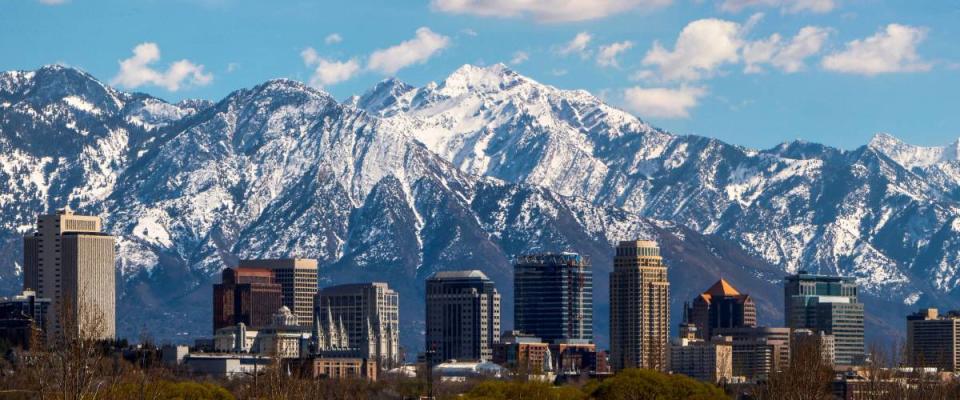
Salt Lake City panorama
Income taxes aren't quite a walk in the park In Utah, a state that's home to no less than five national parks (Arches, Bryce Canyon, Canyonlands, Capitol Reef, and Zion).
A $100,000 annual salary is clipped to $71,146 after state and federal taxes, including the Beehive State's income tax. It stings you for 4.95% of that six-figure income.
Utah also has a 4.85% state sales tax, and local sales taxes can add as much as another 4% at checkout.
Vermont

Montpelier, Vermont, USA town skyline.
When you're pulling down a $100,000 salary in the Green Mountain State, you lose a fair amount of green every payday. That might make you see red — and we don't mean the kind that's on the trees during a beautiful New England autumn.
Your six-figure income shrinks to $71,146 after federal and state taxes in Vermont. The state's income tax slices off an estimated 4.95%.
Vermont has a general state sales tax of 6% that rises to 7% in a couple of cities. The state also slaps a 9% sales tax on restaurant meals and hotel rooms, and a 10% tax on alcoholic beverages served in restaurants.
Virginia

Rosslyn, Arlington, Virginia, USA city skyline on the Potomac River.
Virginia has mountains on one side, the Atlantic Ocean on the other — and a lot of history in between.
Income taxes are in the middle, too: not as high as in some states but not as low as in many others. A $100,000 salary is reduced to $70,829 by federal and state taxes, including the estimated 5.27% that goes to Virginia's state income tax.
The state has a 4.3% sales tax, but the total sales tax can be as high as 7% in some cities in the Old Dominion.
Washington

Paradise area at Mount Rainier National Park, Washington State, USA
Washington is another state without an income tax, meaning employees who work for the giant companies based here — including Amazon, Microsoft and Starbucks — get to keep a larger share of their paychecks.
A $100,000 salary in the Evergreen State is reduced to $76,096 after federal taxes.
Sales taxes can be high in Washington. The state has a 6.5% sales tax, and local taxes can push the total rate to 10.4%.
West Virginia

Charleston, West Virginia, USA skyline at dawn.
In the Mountain State, income taxes aren't as steep as they are in many other parts of the U.S.
An annual salary of $100,000 is knocked down to $70,826 after federal and state taxes. West Virginia's state income tax takes 5.27% of that six-figure income.
Three West Virginia cities — Charleston, Huntington and Parkersburg — collect small weekly fees from workers. The state has a 6% sales tax, and several West Virginia cities collect an additional 1% from shoppers.
Wisconsin

Skyline of Madison of Wisconsin at sunset viewing from Olin Turville Park. Photo showing the state capital and lake Monona with reflections, Madison, Wisconsin, USA.
If you don't like the taxes in Wisconsin, at least you've got beer, cheese and the Green Bay Packers to take your mind off the pay you're losing.
A $100,000 salary in the Badger State is gnawed down to $70,142 by federal and state taxes, with 5.95% of that six-figure income going to the state's income tax.
Wisconsin has a 5% state sales, and local sales taxes can seem puny compared to many other states. The total sales tax is never higher than 5.6%.
Wyoming

The sun sets behind the Teton Range and Snake River in Grand Teton National Park, Wyoming.
This sparsely populated state of woods, mountains and waterfalls does not tax personal incomes, so residents have more take-home pay to spend on their outdoor pursuits.
A worker earning $100,000 a year is left with $76,096, with only federal taxes to pay.
And while the grizzlies in Wyoming can have ferociously strong teeth, sales taxes don't bite too hard. The state sales tax rate is 4%, and the most you'll pay on your purchases is 6%, in some cities

